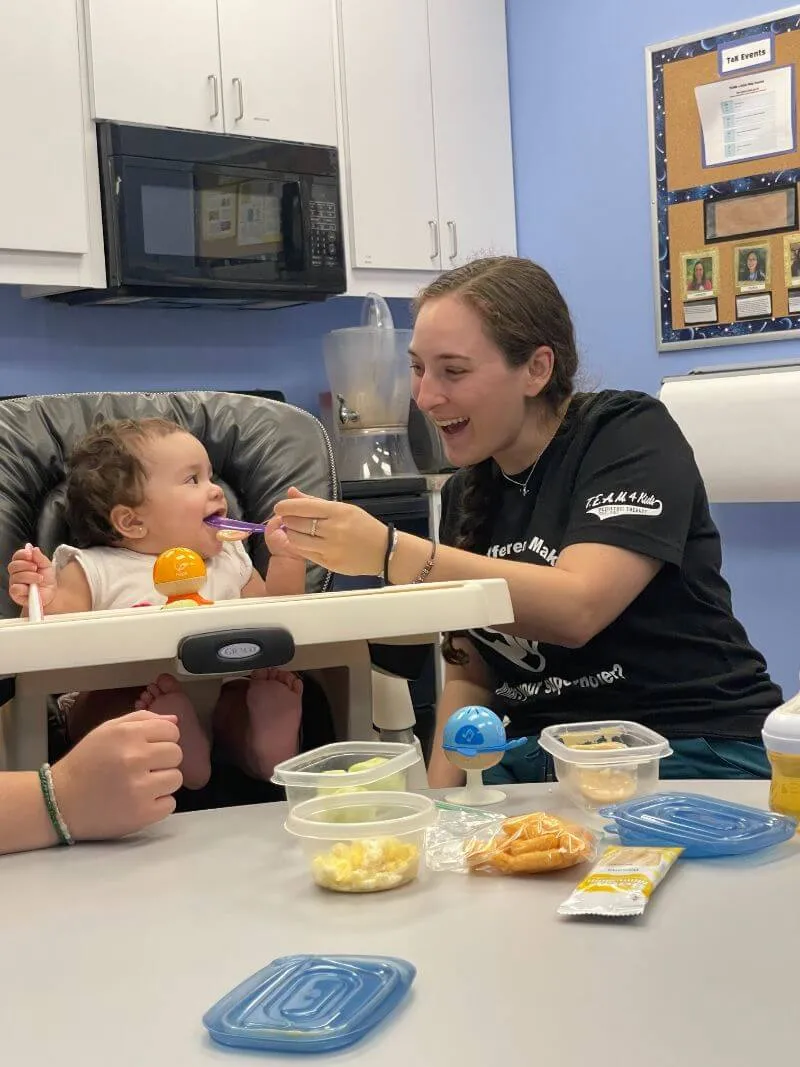Infant Feeding and Lactation Consulting

What is infant feeding?
- Infant feeding can improve your infant’s ability to coordinate their suck-swallow-breathe triad, which is how they functionally drink from a bottle. This can include bottle/nipple changes, positional changes, environmental changes, and referrals to other professionals, such as GIs, nutritionists, OTs, and PTs.
- Your baby should be evaluated for feeding difficulties if they are younger than one year, struggle to consume a developmentally appropriate amount of milk/formula, have difficulty transitioning to purées, or do not accept solid table foods.
What is lactation consulting?
- A certified lactation consultant (CLC) is a professional in lactation consulting who is certified to provide breastfeeding consulting and management to families who are considering breastfeeding or have questions or problems during breastfeeding.
- CLCs provide an individualized approach to breastfeeding consulting where each client is evaluated and treated with their personal concerns in mind.
- CLCs assess the physical, nutritional, and psychosocial aspects and mental status of the mother-baby breastfeeding dyad.
- Pregnant women or mothers are the main client base for this specialty.
- Lactation Consulting can help with: milk supply, difficulty latching, difficulty sustaining a feed, sore nipples, weaning from breastfeeding, helping mothers return to work, creating a positive dyad between mother and baby, educating the family on the importance of breastfeeding for the infant, and the mother, engorged breasts, oversupply, struggling with nursing positions, difficulty with pumping, fears regarding any aspect of breastfeeding, mastitis, and how to recognize baby’s feeding cues.

How to Identify a feeding problem in my infant
- Pulling away from the bottle,
- Refusing or skipping feedings
- Having excess spit-up
- Not eating enough per day
- Arching their back while drinking
- Tongue clicking while drinking
- Leaking fluid from their mouth while drinking
- Coughing or gagging while drinking the bottle
- Showing difficulty latching or sustaining a latch
- Stopping for long breathing breaks while eating.
PURÉE/SPOON – If your infant/child is
- Refusing certain flavors of purée
- Gagging with thicker or textured purées
- Turning their head at the presentation of a spoon
- Crying when placed in their high chair
- Difficulty tolerating touching purée/having messy hands or face while eating
- Not mouthing toys or bringing their hands toward their mouth
- Not reaching towards the spoon as the parent tries to feed them
- Having a preference to drink from the bottle vs transition to eating purée
SOLIDS – If your infant/child is
- Not mouthing toys or placing items in their mouth
- Showing no interest in what you are eating, gagging or vomiting when tasting solid foods
- Not willing to touch solid foods
- Not moving their mouth in a munching pattern by 6-8 months of age
- If their tongue is not moving side to side
- If their jaw is not diagonally jutting while chewing by 12 months of age
- If they only like dry/crunchy snacks
- If they refuse all solids and only eat purée
- If they chew and then spit out harder-to-chew foods
- If they refuse to self-feed
- If they have brand-specific or other food preferences (shape, color, temperature of food), they may need to be seen for an evaluation.
TEAM 4 Kids Making Feeding Easier for you and your Baby
Interested in Groups or Classes?
Will my insurance cover the cost of therapy?
We accept all insurance plans, including AHCCCS. Your insurance benefits will determine how much of your treatment is covered. We don’t want finances to get in the way of your child’s therapy needs. If you have concerns about the cost of care, call us to schedule a free screening so you can learn first hand the benefits of therapy for your child.
What does a lactation consultant do?
A certified lactation consultant (CLC) supports, protects, and promotes the breastfeeding dyad. This can involve a combination of direct skilled treatment with baby and counseling with and supporting mothers.
What can I expect during a LC session?
At evaluation time, a CLC will complete a series of case history questions before analyzing and assessing the baby while eating at breast. During each individual session, the lactation consultant will provide suggestions/intervention to strengthen the breastfeeding dyad and provide support to the parents. Each session will be tailored to the baby and mothers individualized needs.
How long are LC sessions? How long are infant feeding sessions?
Lactation therapy appointments and infant feeding appointments are scheduled for 30-45 minutes long.
What type of training does your LC have?
A CLC must complete a 52-hour comprehensive training course and pass various competencies throughout the course. Then, the CLC must pass a final examination. In addition to the initial 52-hour course, CLCs are required to complete continuing education yearly to keep their skills current and certification valid.
How many sessions do I need to attend?
This is dependent upon you and your child’s needs. The main goal is to ensure you feel confident and comfortable feeding your child and that your child eats without aversion.
Do I need to bring my own materials/breast pump?
It is recommended that you bring any materials you currently use or possibly want to use. The CLC will have some materials to use in session, but not to send home. Materials include nipple shields, breast pump, syringes, boppy pillow, and more.
How old can my child be to schedule lactation therapy?
As long as your child is breastfeeding, you can request and schedule lactation therapy. The most common time to request lactation therapy is within the first few weeks after birth. However, lactation services can be scheduled while pregnant, after birth, or at any point during your lactation journey.
Is it normal to feel some pain when feeding?
No. If you are experiencing any pain when feeding your child, schedule with a CLC to find the root cause of that pain.
